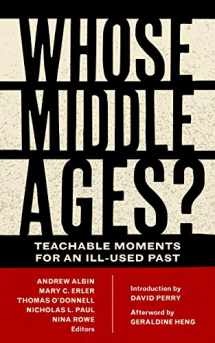
Whose Middle Ages?: Teachable Moments for an Ill-Used Past (Fordham Series in Medieval Studies)
Book details
Summary
Description
Review This book is timely in a way that won’t get old. It has something for everyone, from professional educators seeking to enliven their classrooms to anyone curious about the origins of popular symbols and phrases. With a plethora of compelling case studies from contemporary culture, religion, art, and politics, there are vital lessons on almost every page. In example after example, the authors show how people shape the Middle Ages to reflect their fears and dreams for themselves and for society. The results range from the amusing to the horrifying, from video games to genocide. Whose Middle Ages? Everyone’s, but not everyone’s in the same way.---Michelle R. Warren, author of Creole Medievalism: Colonial France and Joseph Bédier’s Middle AgesWhose Middle Ages? offers an ethical and accessible introduction to a historical period often implicated in racist narratives of nationalism and imperialism. A valuable teaching resource, Whose Middle Ages? will inspire necessary discussions about the politics of engaging the past in the present, as it also recovers a Middle Ages that is complex, messy, and belongs to us all.---Sierra Lomuto, Assistant Professor of English, Macalester CollegeCross-disciplinary, classroom-ready, and super-timely meditations on medievalisms in our midst, benign and malign, and on medieval self-understanding. Recommended.---David Wallace, Judith Rodin Professor, University of PennsylvaniaThis is an important book, filled with brief, accessible essays by a who’s who of experts in medieval studies. As a whole, it demonstrates how scholars can open up their field to a wider audience and why those conversations matter, particularly in our own historical moment when history in general―and the medieval past in particular―is weaponized in the service of hate. Whose Middle Ages? should be on every medievalist’s bookshelf and on every class’ reading list.---Matthew Gabriele, Virginia TechThis is a significant contribution to medieval studies and has already generated discussion among medievalists debating disciplinary politics. ― Journal of Medieval Worlds...Whose Middle Ages? is... charting an iteration of the Middle Ages that is just beginning. ― TMR: The Medieval ReviewThese are timely and well-presented papers... In a troubled world, this is good value for the money; students and their teachers can read these papers to great advantage. ― The Sixteenth Century Journal Product Description Whose Middle Ages? is an interdisciplinary collection of short, accessible essays intended for the nonspecialist reader and ideal for teaching at an undergraduate level. Each of twenty-two essays takes up an area where digging for meaning in the medieval past has brought something distorted back into the present: in our popular entertainment; in our news, our politics, and our propaganda; and in subtler ways that inform how we think about our histories, our countries, and ourselves. Each author looks to a history that has refused to remain past and uses the tools of the academy to read and re-read familiar stories, objects, symbols, and myths.Whose Middle Ages? gives nonspecialists access to the richness of our historical knowledge while debunking damaging misconceptions about the medieval past. Myths about the medieval period are especially beloved among the globally resurgent far right, from crusading emblems on the shields borne by alt-right demonstrators to the on-screen image of a purely white European populace defended from actors of color by Internet trolls. This collection attacks these myths directly by insisting that readers encounter the relics of the Middle Ages on their own terms.Each essay uses its author’s academic research as a point of entry and takes care to explain how the author knows what she or he knows and what kinds of tools, bodies of evidence, and theoretical lenses allow scholars to write with certainty about elements of the past to a level of detail that might seem unattainable. By dem


We would LOVE it if you could help us and other readers by reviewing the book
Book review



